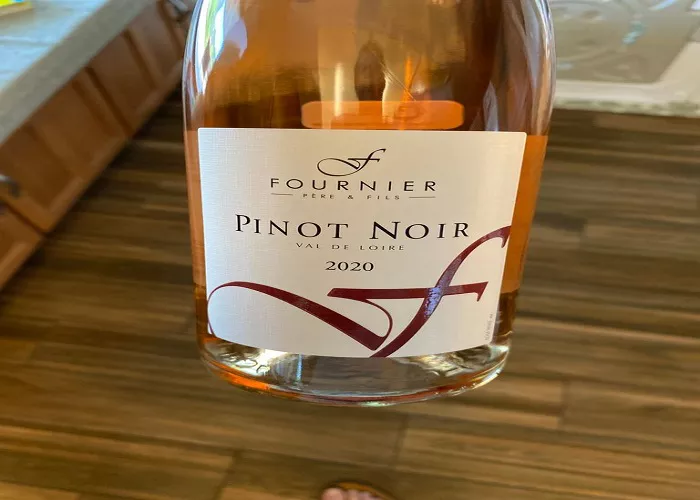The Basics of Pinot Noir Pronunciation
Pinot
The word “Pinot” is pronounced with a short “i” sound, similar to the “i” in “pin.” It is pronounced /ˈpiːnoʊ/. The stress is on the first syllable. This pronunciation is derived from the French origin of the grape variety. The short “i” gives it a crisp and distinct sound, setting it apart from other similar-sounding words.
Noir
“Noir” is a French word meaning “black.” It is pronounced /nwɑːr/. The “n” is pronounced clearly, followed by a “w” sound and then the “a” is pronounced as in “car” and the “r” is a soft, rolled or slightly trilled sound in French, although in some English pronunciations, it may be a less emphasized “r.” The stress is on the single syllable, and this pronunciation gives the wine an air of sophistication and mystery, befitting its often complex and deep flavor profile.
The Pronunciation of Rosé
Rosé as a French Word
“Rosé” is a French term, and in French, it is pronounced /ʁoze/. The “r” is a guttural sound that is difficult for some English speakers to master. It is a sound made at the back of the throat. The “o” is pronounced like the “o” in “go” and the “sé” has a soft “z” sound followed by a long “a” sound. This pronunciation gives the wine a light and airy feel, much like its appearance and often its flavor characteristics.
Anglicized Pronunciation of Rosé
In English, “Rosé” is often pronounced /roʊˈzeɪ/. The “ro” is pronounced like the “ro” in “row” and the “sé” is pronounced with a long “a” sound and a soft “z” as in “lazy.” This Anglicized version is more commonly used in English-speaking countries and is widely understood. However, it is important to note the difference between the French and English pronunciations, especially in more formal wine-tasting or industry settings.
Regional Variations in Pronunciation
French-Speaking Regions
In regions like Burgundy, France, where Pinot Noir is highly regarded and where the wine has its roots, the pronunciation follows the traditional French norms more strictly. Locals would pronounce Pinot Noir Rosé with the authentic French sounds, emphasizing the guttural “r” in “Noir” and the proper French pronunciation of “Rosé.” This pronunciation is a mark of their cultural and winemaking heritage and is used in local wineries, wine festivals, and among connoisseurs in the area.
English-Speaking Countries
In countries such as the United States, the United Kingdom, and Australia, the Anglicized pronunciation is more prevalent. However, in upscale wine bars or restaurants with a more international clientele or a focus on wine education, the French pronunciation may also be heard. Wine professionals in these regions may switch between the two pronunciations depending on the context and the audience they are addressing.
Impact of Pronunciation on Wine Perception
Cultural Association
The correct pronunciation of Pinot Noir Rosé can create a cultural connection. When pronounced in French, it evokes images of the idyllic French vineyards, the centuries-old winemaking traditions, and the romanticized notion of French wine culture. This can enhance the perception of the wine as a refined and sophisticated product, making the drinking experience more than just about the taste but also about the cultural and historical context.
Professionalism in the Wine Industry
In the wine industry, proper pronunciation is a sign of professionalism. Sommeliers, wine critics, and wine merchants who can accurately pronounce Pinot Noir Rosé in both French and English are seen as more knowledgeable and credible. It allows them to communicate effectively with colleagues from different regions and with customers who may have different expectations regarding pronunciation. Incorrect pronunciation could potentially lead to a loss of trust or respect in a professional wine setting.
See Also: What Is La Crema Pinot Noir Rosé
Tips for Learning the Correct Pronunciation
Listen to Native Speakers
One of the best ways to learn the correct pronunciation is to listen to native French speakers or experienced wine professionals who are well-versed in French pronunciation. This could be through watching wine documentaries filmed in French wine regions, listening to French winemakers’ interviews, or attending wine tastings hosted by French sommeliers. By hearing the correct pronunciation repeatedly, one can internalize the sounds and rhythms.
Practice with Phonetic Tools
Utilize phonetic guides and online pronunciation tools. Many language learning websites and apps offer detailed phonetic breakdowns of words. For Pinot Noir Rosé, one can look up the individual words in a French-English dictionary with phonetic notations and practice speaking them aloud. Record oneself and compare the pronunciation to the native or professional examples to identify areas for improvement.
Mimic and Repeat
Practice mimicking the pronunciation. Start with the individual components like “Pinot,” “Noir,” and “Rosé” and gradually combine them. Repeat the full phrase multiple times, trying to imitate the intonation and stress patterns. It may feel awkward at first, but with consistent practice, the correct pronunciation will become more natural.
Conclusion
Related topics


